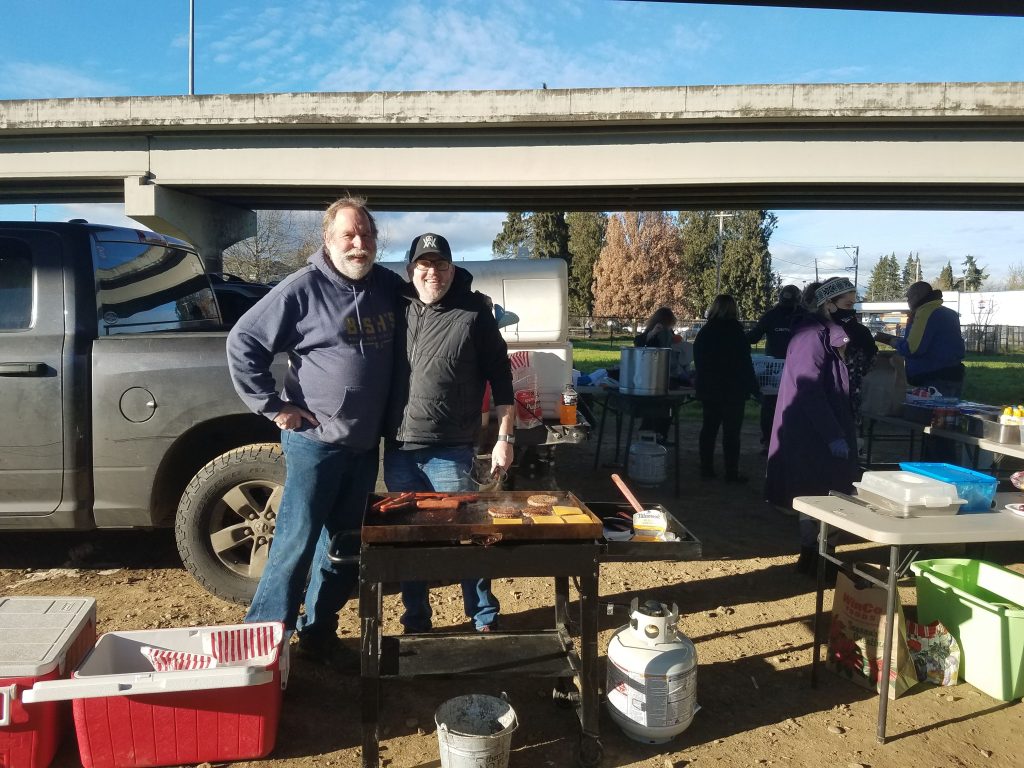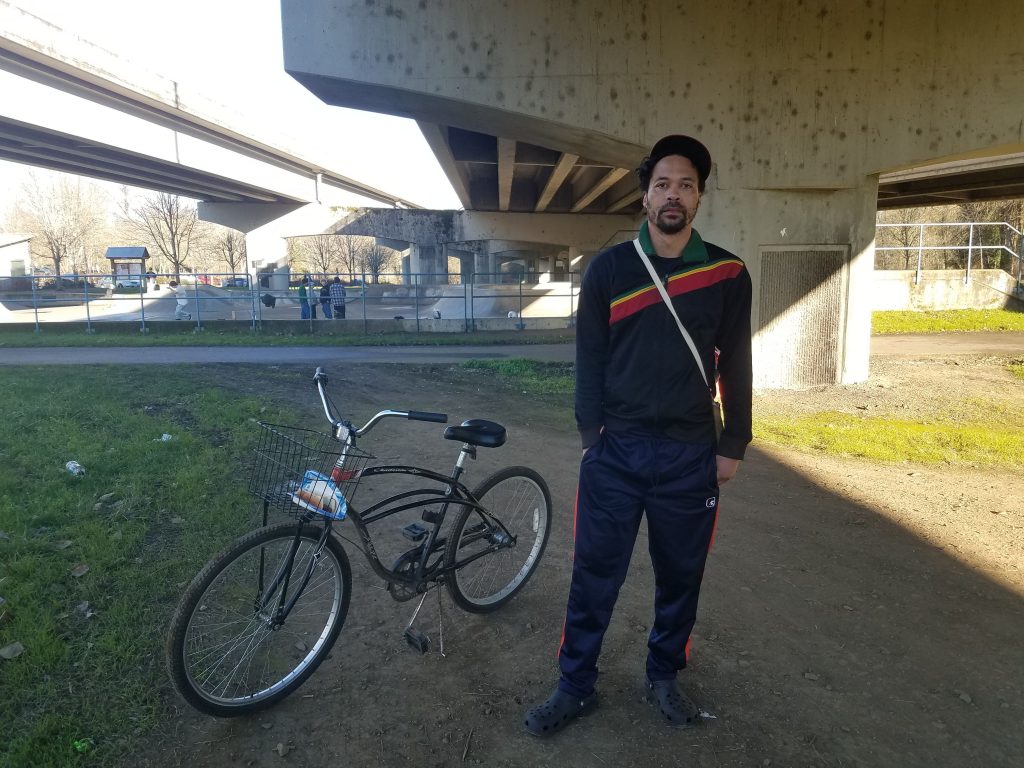 Every Thursday afternoon, Corvallis residents John and Trish Borowski arrive at the Eric Scott McKinley Skate Park to set up a grill and tables stocked with clothes, backpacks, canned and boxed foods, laundry supplies, hygiene products, and other items. With the help of their friends and other community members, the group delivers food, cooks meals and distributes resources to those in the community who might be struggling with homelessness, poverty, unemployment, or other precarious living situations.
Every Thursday afternoon, Corvallis residents John and Trish Borowski arrive at the Eric Scott McKinley Skate Park to set up a grill and tables stocked with clothes, backpacks, canned and boxed foods, laundry supplies, hygiene products, and other items. With the help of their friends and other community members, the group delivers food, cooks meals and distributes resources to those in the community who might be struggling with homelessness, poverty, unemployment, or other precarious living situations.
The Borowskis have been doing this for over a year now, and while they’re thankful for the support they’ve received from several residents, they still face animosity from some others who complain about the increasing presence of unhoused people and camps around the city.
“It’s easy to bastardize them, to put them in a group and say that all homeless people are lazy, [or that] they all use drugs or use alcohol, and we’ve come to find out that’s not true,” said John Borowski. “Some people came up from Southern Oregon after the fires, people lost their homes and apartments because they couldn’t afford it — in the richest nation in the world.”
“People are coming from neighboring counties because those neighboring counties don’t have any services,” said Hezekiah, a community member who has been regularly showing up to these gatherings. “People are coming from California, Washington, all over the place.”
Hezekiah has been unhoused for most of his life. Having grown up in Michigan, he came to Corvallis approximately 12 years ago. He currently volunteers with the Corvallis Daytime Drop-In Center, through which he was recently able to find employment and housing.
“I’ve been unhoused pretty much since I was 17,” he said. “Right now, because of COVID, the Men’s Shelter is only taking so many people, the Women’s Shelter is only taking so many people, and there’s a long list of these [services] that aren’t taking anybody. But even before COVID it was getting out of hand, and there wasn’t enough going on in that department anyway.”
 People Helping People
People Helping People
“I moved to Corvallis from Alaska about three-and-a-half years ago,” said Tim Fankhauser, a community member who assists with cooking and handing out resources. “By the time COVID hit, I lost the job I thought I would get when I got here, and at the time I thought, ‘Now there’s a lot of people out of work, not only from COVID, but also the wildfires that are happening’.”
During that period, Fankhauser was able to receive some financial support from his family before finding employment, and later came into contact with the Borowskis.
“John and Trish and I got together, and I found out they were helping to feed people down at the park every week, no matter who needed it — if you’re homeless or out of a job or whatever the case may be,” said Fankhauser. “I found out that it was out of their own pockets, so I wanted to do everything I could to help. I try to give them a hand and they’ve gotten other friends to help out when they can. And I just think it’s so cool; it’s people helping people — not some organization, just people.”
Much like the Corvallis Really Really Free Market and the Corvallis Community Fridge, such people-led community care efforts often emerge in or beyond moments of crisis when people — in particular marginalized, vulnerable groups — are left behind or insufficiently supported by social services, organizations, or decisions by city, state or federal leaders. In the case of Corvallis and other Oregon cities, these decisions include the displacement of unhoused people through camp sweeps.
“If you look at the history of homelessness in America, the only solutions have been band-aids. It’s like, okay, we’re going to make a shelter, or we’ll do a feeding program, or we’ll give out blankets once a month; it’s never, let’s find a solution that ends homelessness,” said Fankhauser. “I’ve talked to the City Council a couple of times at meetings and said, you know, I don’t know the solution, but how come we’re not trying to seek it out? Why can’t we figure out some solution instead of just constantly pushing it to the side with the sweeps? I think that’s what we do with anybody we don’t like or don’t want to deal with; we just kind of push them out of our sight.”
Much like other community organizers and advocates who have shown up to previous sweeps, Fankhauser has occasionally had to mediate with city and ODOT employees to buy unhoused folks more time to pack up their belongings.
“The other thing that I’ve tried communicating to [City Council] is that, even with the sweeps, they’re not doing what they said they would do,” he said. “They said that when they did the sweeps, these people’s belongings would be kept in storage — it’s going right into a dumpster. And the only time that some of these people have been able to leave with their stuff is because people come to advocate for them. I’ve done it before and said things like, ‘Wait, can we just let her get her stuff in a bag first before you rip this thing apart?’ And luckily, sometimes it works.”
“Both the Oregon Department of Transportation and Corvallis Parks and Recreation are not living up to their end,” said Borowski. “I’ve gone to three different sweeps, and on paper it says that both departments will store their stuff for a month. And several times we’ve seen them just completely wipe out the tents and sleeping bags.”
Fankhauser added, “The other thing is that [ODOT] brings in prisoners to help with these sweeps. We have no idea what their status is as far as COVID goes, and they have no idea what the status of COVID is with the people who are here; they could be bringing it right back into the prisons.”
The morning of Sept. 21, 2021, a sweep was initiated by Corvallis Parks and Rec at Pioneer Park; ODOT inmate crews were scheduled to come down and assist with the sweeps later on. It wasn’t until community advocates informed Parks and Rec employees that several people in the camp were exhibiting COVID-like symptoms that the sweep was called off before the inmate crews had arrived. A testing site was set up by an employee with the Benton County Health Department shortly after.
Camp Sweeps and the Cyclical Garbage Problem
Some in the community recognize that sweeps — or “clean-ups” as they are often called by the city — in addition to failing to address the root causes of homelessness, serve as just another band-aid solution to the generation of litter.
“I would love to know how much money has been spent on the sweeps,” said Amy Wilkerson, another community member who assists with the weekly food and resource distributions. “Could you not have [spent that] on a building or a garbage can? Granted, it can get out of control with the garbage, but that’s because they don’t have anywhere to keep the things that they want.”
“[City leaders] just keep saying, okay, let’s do this for now; let’s sweep the camps so that there’s no mess and the city looks clean,” said Fankhauser. “But then what happens is they go to another spot where you sweep them out of that, and then they go to another spot that gets posted, and it’s just this never-ending problem.”
Hezekiah noted, based on his own observations and experiences with homelessness in Corvallis, a correlation between rising numbers of unhoused people and an increase in the presence of garbage around the city.
“When I first got here, there was a small tight-knit group of homeless people who only camped on the other side of the river, so it wasn’t all out in the open, and there wasn’t as much garbage,” he said. “I think it was probably about after 2012 when I noticed more [unhoused] people started coming into areas that cops [and other city employees] are now cracking down on. They don’t like what they’re doing, but other people have been complaining about these areas for years because of the garbage that gets accumulated, and because they care very much about environmental conservation and protecting ecosystems.”
He added, “I’ve been out there for a long time and I never brought food to my camp, never set any fires. When I first got here I took three tops, three bottoms, a CD player and my CDs; I got rid of everything else. There are people out here who are bringing their whole lives with them, but I understand because they have nowhere else to go.”
Food and resources will continue to be provided at the skate park on Thursdays starting at 4 p.m. All are welcome.
By: Emilie Ratcliff
Do you have a story for The Advocate? Email editor@corvallisadvocate.com

